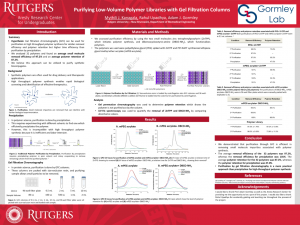Kanagala, Mythili: Purifying Low-Volume Polymer Libraries with Gel Filtration Columns
Title: Purifying Low-Volume Polymer Libraries with Gel Filtration Columns
Name: Mythili Kanagala
Major: Biomedical Engineering
School affiliation: Douglass Residential College,Honors College,School of Engineering
Programs: Aresty – RA Program
Other contributors: Rahul Upadhya, Adam J. Gormley
Abstract: Synthetic polymers are often used for drug delivery and therapeutic applications. High throughput polymer synthesis enables rapid biological screening and identification of effective therapeutics. Meanwhile, purification is crucial to remove small molecule impurities that interfere with biological experimentation. In polymer science, purification is done by precipitation, which is incompatible with high throughput polymer synthesis because it is inefficient and labor-intensive. In protein science, purification is done using gel filtration chromatography. We showed that this technique is better suited for purification in high throughput polymer synthesis due to high removal efficiency, time efficiency, and polymer retention. Polyethylene glycol spiked with zinc tetraphenylporphyrin (ZnTPP) and ethylene glycol methyl ether acrylate were purified. We assessed purification efficiency using ZnTPP and dibenzocyclooctyne-amine (DBCO-NH2), two small molecules used to initiate polymer synthesis and functionalize polymers, respectively. GFC columns and 96-well filter plates were packed with size-exclusion resin by centrifugation. Samples were purified through these columns and analyzed by gel permeation chromatography (GPC) to determine polymer retention and UV-Vis spectroscopy to quantify removal of ZnTPP and DBCO-NH2. We demonstrated that purification through this method is efficient in removing small molecule impurities; as compared to precipitation, it is comparable in removal efficiency but more time-efficient.
